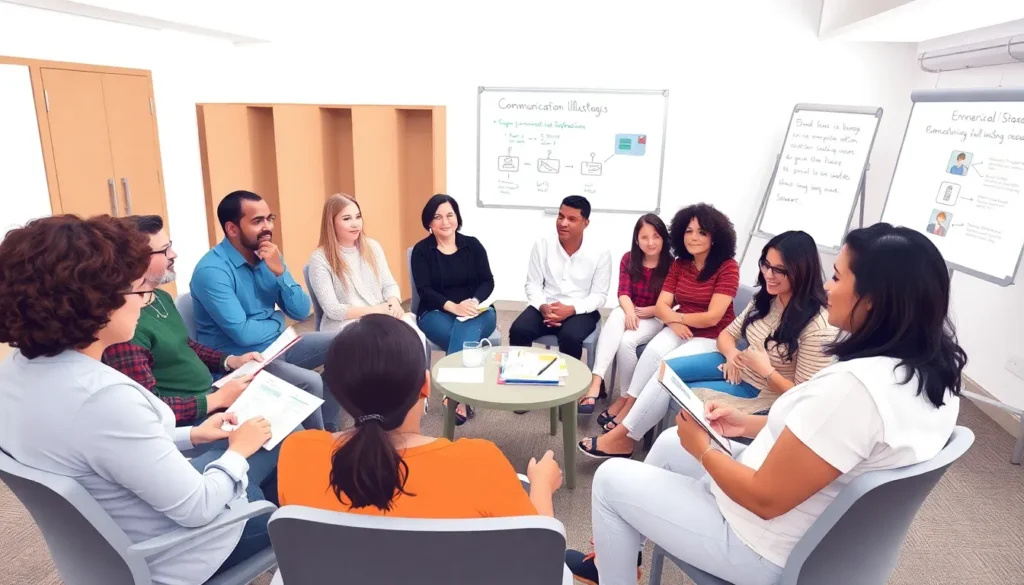Navigating the wild world of parenting teenagers can feel like trying to solve a Rubik’s Cube blindfolded. One moment, they’re your sweet little sidekick, and the next, they’re rolling their eyes like they just discovered a new Olympic sport. It’s a challenging phase filled with mood swings, social media drama, and the occasional existential crisis.
But fear not! This rollercoaster ride can also be a thrilling adventure. With a sprinkle of humor and a dash of patience, parents can turn these tumultuous years into a bonding experience. Understanding the teenage brain and its quirks is crucial. So buckle up and get ready to embrace the chaos, because parenting teens might just be the most rewarding—and entertaining—journey of all.
Parenting Teenagers
Understanding teenage development involves recognizing unique changes in their growth. This phase includes crucial shifts that influence behavior, emotions, and social interactions.
Key Developmental Changes
Cognitive changes occur rapidly during teenage years. Teens develop advanced reasoning and problem-solving abilities. Physical changes, such as puberty, create significant hormonal fluctuations. Identity formation becomes a primary focus as they explore personal beliefs and values. Independence often drives teens toward taking risks as they navigate their own identities. Each change contributes to shaping their personality and actions.
Emotional and Social Challenges
Teens often grapple with intense emotions that can fluctuate wildly. Navigating peer pressure presents substantial challenges in their social interactions. Social media amplifies feelings of comparison, impacting self-esteem. Conflict with parents frequently arises as teens seek autonomy. Developing empathy and strong relationships becomes essential during these years. Understanding these emotional challenges helps parents provide effective support.
Effective Communication Strategies

Effective communication fosters strong relationships between parents and teenagers. Using specific techniques helps navigate this complex phase.
Active Listening Techniques
Active listening enhances understanding between parents and teens. Parents can focus entirely on what teens are saying, maintaining eye contact and avoiding distractions. Reflecting back on their words shows teens that their feelings matter. Asking open-ended questions encourages deeper conversations, allowing for shared insights. Parental validation of emotions strengthens connection. Refraining from offering immediate solutions helps teens express themselves freely. These techniques promote trust, ensuring teenagers feel heard and respected.
Setting Boundaries and Expectations
Setting clear boundaries and expectations provides structure for teenagers. Parents must communicate rules directly while explaining the reasons behind them. Consistency in enforcing these rules builds reliability. Flexibility within established boundaries promotes autonomy, allowing teens to feel in control. Discussing consequences for breaking rules fosters accountability. Encouraging teen input in decision-making strengthens their investment in the household expectations. Clear communication about responsibilities, along with reasonable consequences, prepares teens for future independence. Establishing a framework of trust helps cultivate mutual respect.
Building Trust and Independence
Building trust and promoting independence are vital in parenting teenagers. These elements create a foundation for effective communication and respect.
Encouraging Responsibility
Responsibility grows when teens are entrusted with tasks. Assigning age-appropriate chores gives them a sense of ownership. For instance, managing their own schedules can enhance time management skills. Discuss consequences for unmet responsibilities to reinforce accountability. Recognizing achievements also builds confidence, so celebrate successes, whether big or small. Giving them opportunities to make mistakes fosters learning, preparing them for adulthood.
Supporting Decision-Making Skills
Supporting decision-making skills cultivates independence. Start by involving teens in family decisions, allowing them to express their opinions. Encourage weighing pros and cons before making choices. Discussing potential outcomes helps them understand consequences, enhancing critical thinking. Asking open-ended questions encourages deeper reflection on their choices. Providing guidance rather than directives fosters confidence in their ability to make sound decisions. Modeling effective decision-making in daily life offers a practical, real-world example.
Navigating Common Issues
Parenting teenagers presents challenges such as peer pressure and academic stress. Addressing these issues effectively can strengthen the parent-teen relationship.
Dealing with Peer Pressure
Peer pressure significantly impacts a teenager’s choices and behaviors. Parents can help by fostering a supportive environment where open discussions about influences occur. Encouraging teens to express their feelings regarding friends’ behaviors builds trust. Engaging in role-playing scenarios can prepare teens to handle difficult situations confidently. They benefit from knowing how to assert themselves when faced with peer pressure. Highlighting the importance of self-identity reinforces their ability to make independent decisions. Sharing stories from their own experiences can also illustrate that many face similar challenges.
Managing Academic Stress
Academic stress emerges as a common issue during the teenage years. Parents must recognize signs of stress, such as mood changes or withdrawal. Creating a balanced routine that includes study time, leisure, and social activities fosters a healthier approach to academics. Encouraging teens to set realistic goals helps manage expectations and promotes a sense of achievement. Offering support during challenging subjects can ease pressure, while also celebrating small successes improves motivation. Maintaining open lines of communication about academic experiences allows teens to share concerns comfortably and seek guidance when needed.
Enhancing Family Relationships
Strengthening family relationships during the teenage years is essential. Engaging in shared experiences creates lasting bonds.
Family Activities and Bonding
Participating in family activities promotes connection. Game nights encourage laughter and teamwork. Outdoor adventures, like hiking or biking, help create shared memories. Cooking meals together fosters collaboration and communication. Regular family meetings allow everyone to express their thoughts and feelings. Exploring new hobbies or interests invites creativity and strengthens relationships.
Conflict Resolution Techniques
Effective conflict resolution strengthens family dynamics. Active listening allows each person to feel heard and understood. Parents should encourage teens to express their feelings without fear of judgment. Defining the issue collaboratively helps clarify perspectives. Brainstorming solutions together empowers everyone to take ownership. Implementing chosen solutions reinforces accountability. Maintaining a calm demeanor during disagreements sets a positive example for resolving conflicts.
Conclusion
Parenting teenagers is undeniably a complex journey filled with ups and downs. By embracing the unique challenges of this stage, parents can foster strong connections and support their teens’ growth. Understanding the teenage brain and emotional landscape is crucial for navigating this period effectively.
Open communication, active listening, and setting clear boundaries create a safe environment for teens to express themselves. Celebrating their successes and allowing room for mistakes cultivates confidence and independence.
Ultimately, the rewards of parenting teens far outweigh the challenges. With patience, humor, and a commitment to building trust, parents can guide their teenagers through this transformative phase, preparing them for a successful future.



